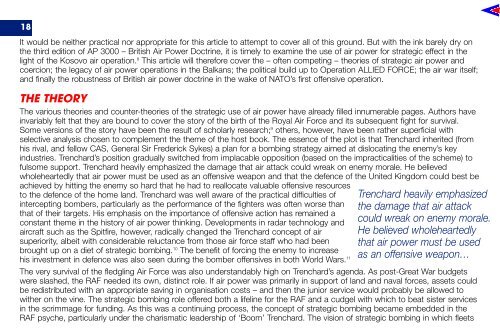THE RAF AIR POWER REVIEW - Royal Air Force Centre for Air ...
THE RAF AIR POWER REVIEW - Royal Air Force Centre for Air ...
THE RAF AIR POWER REVIEW - Royal Air Force Centre for Air ...
You also want an ePaper? Increase the reach of your titles
YUMPU automatically turns print PDFs into web optimized ePapers that Google loves.
18<br />
It would be neither practical nor appropriate <strong>for</strong> this article to attempt to cover all of this ground. But with the ink barely dry on<br />
the third edition of AP 3000 – British <strong>Air</strong> Power Doctrine, it is timely to examine the use of air power <strong>for</strong> strategic effect in the<br />
light of the Kosovo air operation. 8 This article will there<strong>for</strong>e cover the – often competing – theories of strategic air power and<br />
coercion; the legacy of air power operations in the Balkans; the political build up to Operation ALLIED FORCE; the air war itself;<br />
and finally the robustness of British air power doctrine in the wake of NATO’s first offensive operation.<br />
<strong>THE</strong> <strong>THE</strong>ORY<br />
The various theories and counter-theories of the strategic use of air power have already filled innumerable pages. Authors have<br />
invariably felt that they are bound to cover the story of the birth of the <strong>Royal</strong> <strong>Air</strong> <strong>Force</strong> and its subsequent fight <strong>for</strong> survival.<br />
Some versions of the story have been the result of scholarly research; 9 others, however, have been rather superficial with<br />
selective analysis chosen to complement the theme of the host book. The essence of the plot is that Trenchard inherited (from<br />
his rival, and fellow CAS, General Sir Frederick Sykes) a plan <strong>for</strong> a bombing strategy aimed at dislocating the enemy’s key<br />
industries. Trenchard’s position gradually switched from implacable opposition (based on the impracticalities of the scheme) to<br />
fulsome support. Trenchard heavily emphasized the damage that air attack could wreak on enemy morale. He believed<br />
wholeheartedly that air power must be used as an offensive weapon and that the defence of the United Kingdom could best be<br />
achieved by hitting the enemy so hard that he had to reallocate valuable offensive resources<br />
to the defence of the home land. Trenchard was well aware of the practical difficulties of<br />
intercepting bombers, particularly as the per<strong>for</strong>mance of the fighters was often worse than<br />
that of their targets. His emphasis on the importance of offensive action has remained a<br />
constant theme in the history of air power thinking. Developments in radar technology and<br />
aircraft such as the Spitfire, however, radically changed the Trenchard concept of air<br />
superiority, albeit with considerable reluctance from those air <strong>for</strong>ce staff who had been<br />
brought up on a diet of strategic bombing. 10 The benefit of <strong>for</strong>cing the enemy to increase<br />
his investment in defence was also seen during the bomber offensives in both World Wars. 11<br />
The very survival of the fledgling <strong>Air</strong> <strong>Force</strong> was also understandably high on Trenchard’s agenda. As post-Great War budgets<br />
Trenchard heavily emphasized<br />
the damage that air attack<br />
could wreak on enemy morale.<br />
He believed wholeheartedly<br />
that air power must be used<br />
as an offensive weapon…<br />
were slashed, the <strong>RAF</strong> needed its own, distinct role. If air power was primarily in support of land and naval <strong>for</strong>ces, assets could<br />
be redistributed with an appropriate saving in organisation costs – and then the junior service would probably be allowed to<br />
wither on the vine. The strategic bombing role offered both a lifeline <strong>for</strong> the <strong>RAF</strong> and a cudgel with which to beat sister services<br />
in the scrimmage <strong>for</strong> funding. As this was a continuing process, the concept of strategic bombing became embedded in the<br />
<strong>RAF</strong> psyche, particularly under the charismatic leadership of ‘Boom’ Trenchard. The vision of strategic bombing in which fleets

















